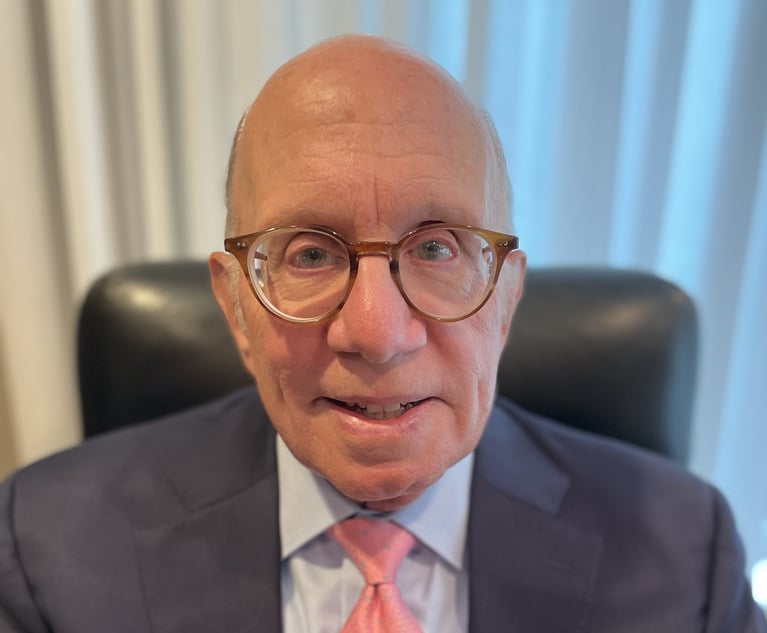Lawyer Trust, and the John Bolton Chess Game
When we practice law, the most valuable tool on our belt is the trust we've earned over the course of our practice.
January 10, 2020 at 10:48 AM
6 minute read
 Although there's virtually no chance that President Trump will be convicted in the Senate, public testimony from former National Security Advisor John Bolton remains the best, real possibility for the impeachment to gain traction in the Senate.
Although there's virtually no chance that President Trump will be convicted in the Senate, public testimony from former National Security Advisor John Bolton remains the best, real possibility for the impeachment to gain traction in the Senate.
Bolton has now publicly offered to testify if subpoenaed by the Senate. And Majority Leader McConnell seems to know that subpoenaing him would be a grievously bad move for his "client" (for lack of a better word)—the president. So McConnell says no!
Still, are the Democrats positive that Bolton's testimony would help them—that Bolton would actually say more than that he didn't want to participate in that "drug deal" that Bolton's nemesis, Rudy Giuliani, a non-government official, was engaged in in the Ukraine? Yes, Bolton is the Democrats' best chance to move some Republican Senators away from the president, so there's probably nothing to lose for them. But can they be sure, given Bolton's mercurial personality and extreme hawkishness in terms of foreign affairs, that, if he testified, he'd say, unequivocally (because, let's face it, it must be unequivocal) that the president himself had gone off the rails and Trump—not just Giuliani—was personally engaged in wrongdoing regarding the Ukraine?
So, think about it as a lawyer trying a case. You wonder whether to call a witness who was never interviewed and who never gave testimony, for whatever reason, about the events or incident in question. The testimony in the case, so far, has been in equipoise. This witness could be the whole ball game—up or down. And you would be calling him blind. How do you decide whether to call him and risk certain defeat because of a strategically bad move?
Not so simple, but your decision will likely be based, oftentimes, on your interaction with the witness's lawyer. Although she may not let you talk to her client, she may decide to give you an extremely valuable head's up on the limited question you want answered: will the witness help me or hurt me? Now, here's the problem for the Democrats. Bolton is represented by Charles Cooper, by all accounts an extremely capable lawyer, but also, decidedly conservative politically. Who knows if the Democrat leaders have actually spoken to him and can make their decision based on what he has to say. Not that Cooper would be untruthful, but he may necessarily be elusive. Remember, Bolton, also an attorney, is totally unpredictable himself. Not to mention that he's a definite hawk on Iran and might be more inclined now—intentionally, or even unconsciously—to have his testimony hue in the direction of the president, given that he is likely pleased by the killing of General Sulemani and the president's recent provocative and tough talk on Iran.
If the Democrats in the House could thoroughly trust the moving target that is Bolton (and is necessarily, therefore, his lawyer), a decision on whether to subpoena Bolton before the House—assuming Bolton would even comply with a House subpoena—would be far easier if the House leadership were talking with Cooper, and confident that he was giving them the "God's honest." And Bolton's lawyer's job in talking to House lawyers would be far easier if he could trust those the lawyers representing the House Majority and the members themselves (who would necessarily be in the loop) to maintain the confidentiality of their discussions. Same deal with the Democrats in the Senate and their lawyers. As a practical matter, not a chance.
Now, fortunately, the rest of us who don't practice law in the hallowed halls of the Congress, needn't deal with the sturm und drang of world shaking events like an impeachment. We don't typically have to worry that if we have off-the-record, candid, conversations with our opposing counsel, that they will invariably leak.
To practice law in a meaningful and effective way, though, we typically need to be able to rely on the value of the opposing lawyer's word and, in many respects more importantly, the perceived value of our own word. We practice law in a fishbowl. If lawyers feel that they can trust us—and, for sure, they check us out with other members of the bar, just as we do—they tend to become more reliable themselves when they make representations or proffers of positions to us.
Now, it may very well be that Cooper has simply told both sides in this skirmish "I can't talk to you," as that might be in the best interests of his client. Too, it may very well be, as suggested by some commentators, that Bolton's recent announcement that he would testify at the Senate if subpoenaed is based upon his publisher's views on how to best sell his forthcoming book. And that may indeed be a very fair position for a lawyer to take. Still, in that chess game that Bolton is certainly playing, one must wonder if Cooper is talking to one side "on background" (as they say), but not the other, and possibly disclosing conversations he's had with the other side. Perfectly ethical, to be sure, unless it violates a specific agreement of confidentiality. And we will likely never know if that is the case.
So let's put Bolton and Cooper completely aside—we really don't know what's been going on there (and likely won't unless and until we read Bolton's forthcoming book). So, assume this hypothetical: You learn that in a case you're litigating that a witness's lawyer has been talking to your opponent, but not you. When you litigate the next time against him, how willing will you be to let your hair down in talking to him if you learn somehow, maybe from the grapevine, that he's been disclosing the conversations he's had with you?
It's often good to be cagey as a lawyer—that's what chess is all about—but one has to be concerned that one's cageyness last time around doesn't come home to bite him in the ass. When we practice law, the most valuable tool on our belt is the trust we've earned over the course of our practice.
Preachy, yes. But true!
Joel Cohen is senior counsel at Stroock & Stroock & Lavan, where he practices white-collar criminal defense law. He teaches at both Fordham and Cardozo Law Schools and is the author of "I Swear: The Meaning Of An Oath" (Vandeplas Pub., 2019).
This content has been archived. It is available through our partners, LexisNexis® and Bloomberg Law.
To view this content, please continue to their sites.
Not a Lexis Subscriber?
Subscribe Now
Not a Bloomberg Law Subscriber?
Subscribe Now
NOT FOR REPRINT
© 2024 ALM Global, LLC, All Rights Reserved. Request academic re-use from www.copyright.com. All other uses, submit a request to [email protected]. For more information visit Asset & Logo Licensing.
You Might Like
View All
Why Is It Becoming More Difficult for Businesses to Mandate Arbitration of Employment Disputes?
6 minute read
Trending Stories
- 1Gibson Dunn Sued By Crypto Client After Lateral Hire Causes Conflict of Interest
- 2Trump's Solicitor General Expected to 'Flip' Prelogar's Positions at Supreme Court
- 3Pharmacy Lawyers See Promise in NY Regulator's Curbs on PBM Industry
- 4Outgoing USPTO Director Kathi Vidal: ‘We All Want the Country to Be in a Better Place’
- 5Supreme Court Will Review Constitutionality Of FCC's Universal Service Fund
Who Got The Work
Michael G. Bongiorno, Andrew Scott Dulberg and Elizabeth E. Driscoll from Wilmer Cutler Pickering Hale and Dorr have stepped in to represent Symbotic Inc., an A.I.-enabled technology platform that focuses on increasing supply chain efficiency, and other defendants in a pending shareholder derivative lawsuit. The case, filed Oct. 2 in Massachusetts District Court by the Brown Law Firm on behalf of Stephen Austen, accuses certain officers and directors of misleading investors in regard to Symbotic's potential for margin growth by failing to disclose that the company was not equipped to timely deploy its systems or manage expenses through project delays. The case, assigned to U.S. District Judge Nathaniel M. Gorton, is 1:24-cv-12522, Austen v. Cohen et al.
Who Got The Work
Edmund Polubinski and Marie Killmond of Davis Polk & Wardwell have entered appearances for data platform software development company MongoDB and other defendants in a pending shareholder derivative lawsuit. The action, filed Oct. 7 in New York Southern District Court by the Brown Law Firm, accuses the company's directors and/or officers of falsely expressing confidence in the company’s restructuring of its sales incentive plan and downplaying the severity of decreases in its upfront commitments. The case is 1:24-cv-07594, Roy v. Ittycheria et al.
Who Got The Work
Amy O. Bruchs and Kurt F. Ellison of Michael Best & Friedrich have entered appearances for Epic Systems Corp. in a pending employment discrimination lawsuit. The suit was filed Sept. 7 in Wisconsin Western District Court by Levine Eisberner LLC and Siri & Glimstad on behalf of a project manager who claims that he was wrongfully terminated after applying for a religious exemption to the defendant's COVID-19 vaccine mandate. The case, assigned to U.S. Magistrate Judge Anita Marie Boor, is 3:24-cv-00630, Secker, Nathan v. Epic Systems Corporation.
Who Got The Work
David X. Sullivan, Thomas J. Finn and Gregory A. Hall from McCarter & English have entered appearances for Sunrun Installation Services in a pending civil rights lawsuit. The complaint was filed Sept. 4 in Connecticut District Court by attorney Robert M. Berke on behalf of former employee George Edward Steins, who was arrested and charged with employing an unregistered home improvement salesperson. The complaint alleges that had Sunrun informed the Connecticut Department of Consumer Protection that the plaintiff's employment had ended in 2017 and that he no longer held Sunrun's home improvement contractor license, he would not have been hit with charges, which were dismissed in May 2024. The case, assigned to U.S. District Judge Jeffrey A. Meyer, is 3:24-cv-01423, Steins v. Sunrun, Inc. et al.
Who Got The Work
Greenberg Traurig shareholder Joshua L. Raskin has entered an appearance for boohoo.com UK Ltd. in a pending patent infringement lawsuit. The suit, filed Sept. 3 in Texas Eastern District Court by Rozier Hardt McDonough on behalf of Alto Dynamics, asserts five patents related to an online shopping platform. The case, assigned to U.S. District Judge Rodney Gilstrap, is 2:24-cv-00719, Alto Dynamics, LLC v. boohoo.com UK Limited.
Featured Firms
Law Offices of Gary Martin Hays & Associates, P.C.
(470) 294-1674
Law Offices of Mark E. Salomone
(857) 444-6468
Smith & Hassler
(713) 739-1250








